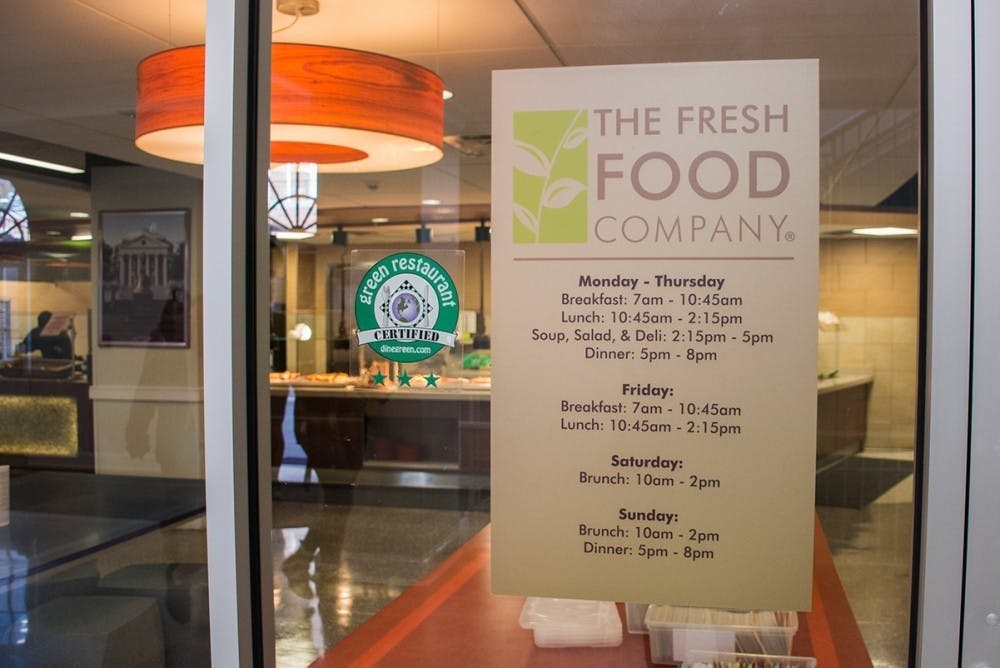1. Coffee, coffee, coffee
If I could make “Go to Starbucks” 1 through 10 on this list, I would. During first year when dorm life was in full swing, Starbucks was basically my living room. I would go there, always with the intention of studying and end up watching Netflix or reading — all while drinking inordinate amounts of caffeine. If the first week of class is getting overwhelming or hectic, it’s always helpful, though probably not healthy, to drown your anxieties in coffee, and, perhaps more importantly, to have somewhere to which you can escape.
2. Lunches
Figuring out where, when and what to eat is an integral part of your first week. For first-years, unfortunately, you’re pretty much stuck with the dining halls. However, don’t forget about the places that you can use meal exchange. I would recommend abusing that system as much as possible, especially at Chick-fil-A. If you’re an upperclassman or a first-year that just wants to eat normal food, the Corner is a small mecca for food options. It has the classics like Bodo’s, Roots and Take It Away to the more underrated gems like Lemongrass and Revolutionary Soup. While you’re there for food, I would recommend going for a second cup of coffee at Starbucks.
3. Plan little breaks with friends
To be honest, the first week of classes isn’t exactly work-intensive, so use this free time to enjoy your life before it slowly fades away into hours of studying. A perk of the first week of classes that many of us science students enjoy is the lack of labs — that’s five extra hours plus however many hours it takes for me to emotionally recover from whatever disaster experiment I just performed. Now is the perfect time to remind your friends that you exist before you have to fade into the stacks of the library.
4. Get ahead on work
Since there isn’t much work yet, you can put in a few extra hours now and then you’ll have a few to spare in the coming weeks when you need them for a light snack or a good mental breakdown. At the very least, look over a syllabus or two so you don’t get behind.
5. Settle into a routine
Going to classes for the first time can be intimidating, especially if you don’t know what to expect. If you’re a first-year, I highly suggest you know where your classes are before you actually have to go to them — not just the buildings, but the classrooms themselves. Nailing down minor details like where your classes actually are and when is the best time to study or eat or, let’s be honest, take a nap is an easy way to make your life easier later on. Once you figure out which route can get you from Wilson Hall to Gilmer Hall in 15 minutes and where you’re going to go in between classes for a snack, classes will be much less daunting.
6. To-do lists
I’ll remember that I have to do something and then five seconds later it’s completely forgotten again. So essentially, I have the memory of a squirrel. Even if you are great at remembering things, it’s easy for important tasks to get lost in the shuffle. That is why to-do lists are my holy gospel. Everyone has a different system for not completely forgetting all their responsibilities — find yours and you’ll at least have the illusion that you’re on top of things.
7. Office hours
Most of the time I don’t go into office hours until I have a question or an assignment I need help on. But sometimes, it’s nice to go in during the first couple weeks of class just to introduce yourself. I highly recommend just getting into the habit of going to office hours, even if you think you’re on top of the class material. It’s a great way to get to know your professors and make the class work seem less intimidating. I still go back to office hours to visit some of my professors from last year.
8. Sleep
The first week of class is a rare time in your college life when you actually have time to sleep because you don’t have to stay up wildly late finishing assignments or studying. Take advantage of it and bank some sleep hours in preparation for the many long nights ahead. I personally have a habit of overestimating the amount of time I have before I should go to sleep. I end up stay up watching whatever I happen to be obsessed with at the time — which is “One Tree Hill” at the moment. So if you do that too, do yourself a solid and only watch one episode.
9. Classroom contacts
Chances are you have at least one class you know is going to be completely terrible and yet you either have to take it or you’ve convinced yourself that you’re actually much smarter and more capable than your past experiences might suggest. Though it is possible you’ve had an intellectual metamorphosis or the class is deceptively easy, I would suggest having at least one phone number from a person in your class for when you find yourself completely lost. Better to text that person in a panic as opposed to emailing your professor at 1 a.m.
10. Remember to have fun
We’re all here to learn and going to class is obviously a very important step in that process. Most classes at the University are engaging and exciting. The professors care about their subjects and they care that you understand and benefit from their knowledge. With the academic freedom we have as students, you’re hopefully taking classes that interest you, so remember that you chose them because you wanted to learn what is being taught. If you regret signing up for that 8 a.m. after two classes and you want to drop out and become a barista, just remember why you’re here.







